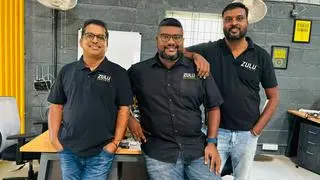India is fast becoming a hotbed for climate action, and there exists a massive untapped opportunity for climate entrepreneurship. The country’s clean technology start-ups are working on developing solutions for a sustainable future. This in turn creates a buzz across the entire ecosystem, with investors and entrepreneurs looking to invest in this field.
Start-ups have varied approaches, from neutralising plastic waste to recycling end-of-life batteries for organic waste management and even purifying air and water. These cleantech start-ups represent a growing trend in India towards embracing clean technology for mitigating the environmental impact brought on by industrialisation and urbanisation.
The sector has amassed funding worth $1.51 billion in 2023 and has so far raised $595.6 million in 2024, according to data by Tracxn, a market intelligence platform.
Niche problem solvers
Start-ups in the cleantech space are aiming to solve the problems of the future with various applications.
Take Log9 Materials for example. The battery technology start-up has developed a technology low-cost, long-lasting Lithium-ion batteries for both stationary and automotive applications such as electric vehicles (EVs). The technology used in the battery is similar to that of hydrogen fuel cells but more economical, efficient, safer and scalable.
The Bengaluru-based company’s primary customers are EV makers (OEMs) manufacturing commercial and passenger vehicles, including 2-wheelers, 3-wheelers and 4-wheelers.
“We target these segments as they have the most significant potential to impact decarbonisation efforts,” says Pankaj Sharma, Co-Founder and Director at Log9 Materials. In FY23-24 alone, the battery tech start-up raked in over ₹110 crore in revenue.
Entrepreneurs are also working towards neutralising plastic waste
Gurugram-based The Disposable Company neutralises the impact of plastic waste generated by packaging companies. They do this by recovering an equal amount of plastics from landfills and recycling it
Founded by Bhagyashree Bhansali in 2020, the company operates on a B2B model, generating revenue by charging businesses for its plastic neutrality services. The core of their service involves recycling an equivalent amount of plastic waste, primarily from the Ghazipur landfill, to offset the plastic usage from various companies. By directly managing the entire process — from waste collection to recycling — the company ensures transparency and traceability.
“We offer tiered pricing plans based on the volume of plastic waste a brand needs to offset. Our primary revenue stream comes from these subscription-based plans, where brands pay us to manage plastic neutrality efforts,” says Bhagyashree Jain, Founder, The Disposal Company. The plastic neutering firm anticipates a CAGR of around 150 per cent over the next two to three years. It also has expansion plans in its pipeline, with a target to enter the UK and Singapore markets.
Another start-up cleaning up the battery waste generated is Founded in 2020 by Utkarsh Singh and Vikrant Singh, the Gurugram-headquartered start-up recycles end-of-life lithium ion (Li-ion) batteries to make battery-grade materials
BatX operates on a hub-and-spoke business model, sourcing batteries locally from various States in bulk. These batteries are initially processed into a powder called ‘black mass’ at regional facilities. The ‘black mass’ is then transported to a central hub, where they use proprietary methods to extract valuable materials with less than 1 per cent impurities. This process allows the start-up to extract high-quality lithium, nickel, cobalt and manganese from Li-ion batteries
The start-up also extracts other materials such as aluminium, copper and stainless steel from recycled batteries, which it then sells to recyclers.
“BatX Energies targets electric vehicle manufacturers, electronics producers, energy storage companies and raw material suppliers, offering sustainable battery recycling and refurbishment solutions.,” says Utkarsh Singh, CEO and Co-founder at BatX Energies.
The company’s primary revenue streams are extracting high-demand materials, such as lithium, nickel, cobalt and manganese, which are sold to cell manufacturers and additionally selling materials such as aluminium and copper to local markets.
In the coming years, BatX looks to expand the South African market, the US and Europe. The company closed FY24 with ₹250 million in revenue, achieving a 238 per cent growth in volumes compared to last year, and has increased its recovery efficiency to 97.5 per cent and achieved 99.93 per cent metal purity.
“BatX is on track to clock ₹900 million in FY25 and ₹1 billion by FY28,” says Singh, proudly.
Investor attention
Growth in the sector is also backed by large-scale investments and infrastructural developments.
“While early-stage VC support is fairly robust for climate tech start-ups, there is limited growth capital available, especially for capex-heavy climate technology start-ups. As a result, many start-ups rely on debt financing over equity capital for their scale-up,” notes Supriya Sharma, Partner-Insights, IIMA Ventures
In just the last decade, more than 2,600 climate tech start-ups have been registered with about 800 being currently operational.
“With one out 4 start-ups raising funding in the last 10 years, the sector saw a cumulative funding of about $3.6 billion. However, during the same period, fintechs in India raised over $19 billion. It is a sign that Indian climate tech start-ups are just about finding their place within the wider start-up ecosystem,” says Sharma










Comments
Comments have to be in English, and in full sentences. They cannot be abusive or personal. Please abide by our community guidelines for posting your comments.
We have migrated to a new commenting platform. If you are already a registered user of TheHindu Businessline and logged in, you may continue to engage with our articles. If you do not have an account please register and login to post comments. Users can access their older comments by logging into their accounts on Vuukle.